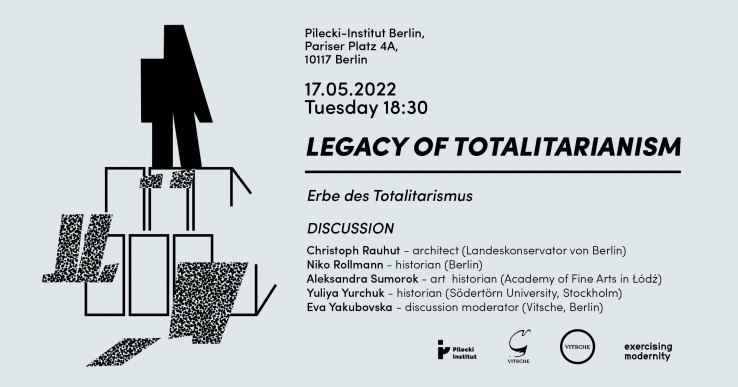Legacy of Totalitarianism - new lecture series - Instytut Pileckiego
17.05.2022 (Tue) 18:30
Legacy of Totalitarianism - new lecture series
The Legacy of Totalitarianism is a new lecture series examining the intimate relationship between history, culture and the public space

Introducing a new Exercising Modernity lecture series:
Legacy of Totalitarianism - Erbe des Totalitarismus
17.05, 18.30 | Pariser Platz 4A, 10117 Berlin
Registration: events@pileckiinstitut.de
Panelists:
Christoph Rauhut - architect, (State Conservator of Berlin)
Niko Rollmann - historian (Berlin)
Aleksandra Sumorok - art historian (Academy of Fine Arts in Łódź)
Yuliya Yurchuk - historian (Södertörn University, Stockholm)
Eva Yakubovska - discussion moderator (Vitsche Berlin)
Organizers: Pilecki-Institut Berlin and Vitsche Berlin
The Legacy of Totalitarianism is a new lecture series examining the intimate relationship between history and culture as inherited by both society and, broadly speaking, the public space in Berlin. It is, however, a heritage which comes at a huge cost – working through its traumatic dimension might only be feasible by applying the framework of transitional justice.
The first step of this process is to name the aforementioned traumatic experience which in turn will reveal hidden meanings behind invented images and enable to explore the concept of post-totalitarian civilization. Rather than merely developing a solid grasp of the notion of “de-totalitarianisation” this panel discussion aims to significantly extend its meaning. It Is thus meant to be the first indispensable stepping-stone towards manifesting the right for justice.
The Legacy of Totalitarianism: Architecture
No totalitarian regime can be established without keeping a monopoly on truth - yet in order to do so it has to absorb various elements of the national, social and cultural heritage of a given country. This in turn allows totalitarian regimes to make fully use of the force of myth. The Soviet War Memorial in Tiergarten and the two tanks from Charkiw standing on pedestals in front of it provide an interesting case-in-point: On the one hand traces of its totalitarian roots strike the eye immediately, but on the other hand the war memorial is undoubtedly steeped in history and real historic events. In a way the former overshadows and absorbs the latter - these days it is largely forgotten that the tanks were first designed and constructed in Charkiw.
This lecture addresses one of the central dilemmas at the heart of monumental architecture and an honest assessment of its contribution to the cityscape: How to shed light on the dark side of its establishment and unveiling, name the offender and occupier and develop a deep grasp of post-totalitarian understanding whilst treasuring the past and giving justice to all of its complexity.